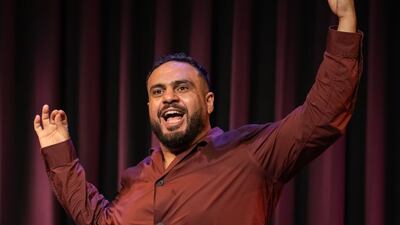Palestinian actor Alaa Shehada had been performing fragments of a story for months. It began with a four-minute piece that grew to 10 minutes, then 15, before he realised he had a full one-man play.
The Horse of Jenin, about a statue that once stood in his home town in the occupied West Bank city of Jenin, earned him a Fringe First award at the Edinburgh Festival Fringe this month. The recognition, organised by The Scotsman, is among the most coveted at the world's largest arts festival.
For Shehada the prize validates more than craft. “The show tells a story that has always mattered, and never more so,” he tells The National from Edinburgh, where he continues performing nightly until the festival ends on August 25.
“As the genocide in Gaza and the West Bank continues, and the occupation of Palestine persists, we must keep amplifying Palestinian voices, preserving culture and advocating for justice, freedom and an end to the violence.”
The play centres on a horse sculpture that stood in Jenin. Built in 2003 from debris left after an Israeli military incursion, the statue became a local landmark. In 2023, Israeli forces destroyed it with a bulldozer.
Shehada, now based in Amsterdam, recalls feeling an urgent need to respond. “What is it that makes the army fear a statue?” he says. “What is that thing that this statue brings that let them take it and just remove it? And it disappeared in a second from our lives.”
The destruction forced him to consider “what a statue can do and what a symbol of resistance, resilience can do.” Those questions became the foundation for a 70-minute performance that weaves together childhood memories, family stories and moments of absurdity that punctuate life under occupation.
“It's about what is on our skin,” Shehada says. “It's all about the story, about how hard the daily life is here, and funny sometimes, and confusing. So it has everything in one day.”
During the writing process, Shehada stuck scenes across his bedroom wall and unearthed memories he hadn't planned to include. One was his English teacher Samir, who acquired Jenin's first mobile phone when Shehada was six.
“It's so big, we called it the fridge,” he recalled. “Samir is so impressed, showing it off wherever he goes. Everywhere he goes, he speaks English because he wants every Palestinian to speak English.”
The memory expanded to include the antenna, Samir parading the phone around town. “These details allow the show to live, to really beat,” Shehada said.
The Horse of Jenin shifts between such moments and deeper loss without warning. Audiences laugh at Samir's phone theatrics, then sit quietly as Shehada describes meeting his girlfriend “secretly under the horse's legs, the statue of the horse” or the death of his childhood friend Ahmed.
“That's what makes it special to those not familiar with daily life of Palestinians,” he says. “It makes you experience everything in terms of emotions. You're laughing; and then you're sad and depressed; and then you're confused and not understanding; and then you're educated; and then you're shocked; and then you're laughing so hard; and then you have tears.”
Beyond theatre, Shehada cofounded the Palestinian Comedy Club in 2019, splitting operations between London and Jenin. The collective runs workshops in the West Bank and tours internationally. This month, five comedians are performing in Edinburgh, Glasgow and Newcastle.
“Comedy has many ways of reaching people,” Shehada says. “First, it breaks the stereotypes about Palestinians because international comedy has one stereotype about how Palestinians look and act. You see us, you watch us all over the media – it's like checkpoints, fighting, and you don't see how a love story grows in Palestine.
”You don't see how a teacher, an English teacher, teaches his kids in a little school in Jenin. You don't see how the conversation happens in my family about me gaining more kilograms. You don't see the messages that we give to our lovers.”
Shehada's own circumstances reflect the displacement that shapes Palestinian experience. Though born in Jenin, he has spent the past 15 years working between the Netherlands, UK, US and Australia, recently settling more permanently in Amsterdam.
When asked about home, he paused. “There is no home,” he said. “I live in Jenin, I'm from Jenin, the West Bank, and I was there all the time, but I have moved over the past two years to Amsterdam.”

With The Horse of Jennin to be performed in Europe, North America and Australia next year, Shehada's life as a touring artist compounds the complexity. “That's why, when you ask me about what's home, it's really difficult to say what's home,” he says. "Even if I'm sitting down, I stay two or three months and then go to the UK. Then I go to Jenin and then somewhere else.”
The work also represents a broader Palestinian response to loss that extends beyond art.
“This is something to do with the Palestinian mentality: if you lose your friend, you have to live, you have to keep moving,” he says. “If you go from Jenin to Nablus and there's a checkpoint, you don't go back. You go to the mountain, find another way to go to Nablus.”
While that survival instinct can drive creative expression, Shehada is clear about its source. “It's coming from a painful place from all of us," he says.
"It's a way to stay alive under an occupation. It's something that pushes you to stay alive, otherwise you're smashed. You are full of sadness and depression and hopelessness because of the situation.
“Ultimately, what we want to do – like everyone in this world – is to live. That is our only demand. We want to end occupation and have a normal life.”
The Horse of Jenin by Alaa Shehada is playing at Pleasance Dome as part of the Edinburgh Festival Fringe until August 25


